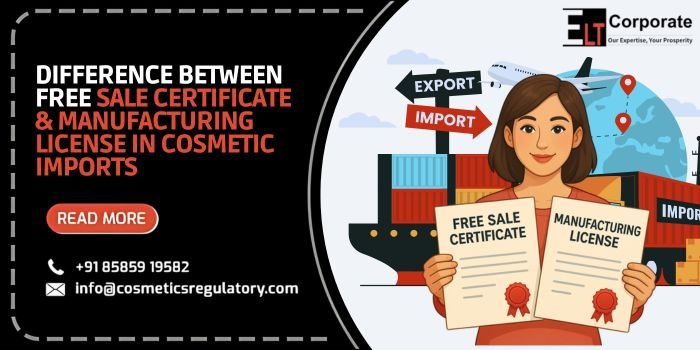Cosmetic imports in India are highly regulated under the Drugs and Cosmetics Act, 1940 and Cosmetic Rules, 2020, with the Central Drugs Standard Control Organisation (CDSCO) regulatory bodies.
Two of the most essential documents required for cosmetic import registration are free sales certificates (FSC) and manufacturing license (ML). Although both regulators work as evidence, they vary in their objectives, release authority, and role in the CDSCO approval process.
This guide explains the difference between FSC and ML in detail, including definitions, requirements, procedures, deadlines and compliance tips.
Also read: cosmetic license for handmade soap
Definition of Free Sale Certificate (FSC)
A free sales certificate is an official document issued by the export authority of the exporting country.
It proves that cosmetic products are sold independently in the domestic market of that country and are safe for human use.
Issuing Authority:
- Ministry of Health, Trade Authority, Chamber of Commerce, or equivalent in the exporting country.
Purpose:
- Acts as proof of safety and free circulation in the country of manufacture.
Definition of Manufacturing License (ML)
A manufacturing license is a legal authority provided by the competent authority in the country that allows the production of cosmetic products in a specified feature.
It establishes that the manufacturer follows good manufacturing practices (GMP) and complies with local cosmetic rules.
Issuing Authority:
- National or regional drug/cosmetic control authority of the country where the product is manufactured.
Purpose:
- Ensures that the cosmetic product has been manufactured legally and under regulatory compliance.
Understanding the Role of FSC & ML in Cosmetic Imports
For CDSCO approval of cosmetic imports, both an FSC and a Manufacturing License are mandatory.
- FSC proves market acceptance and safety of the product in the home country.
- ML proves the regulatory compliance of the manufacturing facility.
Together, they build product credibility and allow CDSCO to grant import registration (Form COS-2).
Key Differences Between FSC and Manufacturing License
| Criteria | Free Sale Certificate (FSC) | Manufacturing License (ML) |
| Definition | Proof that the cosmetic is freely sold in the domestic market of the exporting country. | Proof that the cosmetic is legally manufactured in a licensed facility. |
| Issuing Authority | Government trade/health department or Chamber of Commerce of an exporting country. | National cosmetic/drug regulatory authority of the manufacturing country. |
| Purpose | Ensures product is safe, approved, and not banned in the country of origin. | Ensures product is manufactured legally under GMP standards. |
| Requirement in CDSCO Process | Required to establish product credibility for import registration. | Required to establish the legitimacy of manufacturing facility. |
| Validity | 6 months–2 years (varies by country). | 2–5 years (depending on jurisdiction). |
Why Are FSC & ML Required for CDSCO Cosmetic Import Registration?
Both documents are crucial for the import registration of cosmetics in India because:
- They help CDSCO verify product safety and compliance.
- They prevent unsafe, unregulated, or counterfeit cosmetics from entering the Indian market.
- They are part of the mandatory checklist for filing an import license under Form COS-1.
Step-by-Step Process to Obtain FSC and ML
Step 1: Identify Regulatory Authority
Which rights in the export country release FSC and ML.
Step 2: Apply with the required documents
Apply with details such as product composition, label, GMP compliance and feature details.
Step 3: Review and Issuance
Authorities review documents, may request clarifications, and issue an FSC or ML after scrutiny.
Documents Required for FSC and ML
Documents for Free Sale Certificate (FSC)
- Application form (as per issuing country)
- Product ingredient list
- Labels & artwork
- Certificate of Analysis (if applicable)
- Company incorporation details
- Fee challan/receipt
Documents for Manufacturing License (ML)
- Application form (as per issuing country)
- Plant Master File & layout
- List of equipment & machinery
- GMP compliance declaration
- Company incorporation certificate
- Fee challan/receipt
Timelines & Validity of FSC vs ML
- FSC: Usually issued in 2–4 weeks; validity 6 months–2 years depending on the country.
- ML: Can take 2–6 months depending on regulatory authority; validity 2–5 years.
Common Challenges in Obtaining FSC & ML
- Delays due to incomplete documentation.
- Variation in issuing authorities across countries.
- Notarization/legalization requirements for Indian submission.
- Language translations (if documents are not in English).
Benefits of Hiring a CDSCO Consultant
- Ensures correct documentation as per CDSCO requirements.
- Liaises with foreign manufacturers and authorities.
- Handles legalisation and notarization processes.
- Saves time during application, query resolution, and approvals.
For expert help, ELT Corporate Pvt. Ltd. provides end-to-end support for cosmetic import licensing in India.
FAQs
1. Is Free Sale Certificate mandatory for cosmetic imports in India?
Yes. FSC is mandatory as it establishes that the product is freely sold in its home country.
2. Can a Manufacturing License alone substitute FSC?
No. Both FSC and ML are required—FSC proves product approval, while ML proves manufacturing legitimacy.
3. Who applies for FSC & ML when importing cosmetics into India?
The foreign manufacturer must obtain FSC & ML in their country and provide it to the Authorised Indian Agent (AIA) for CDSCO submission.



